Beirut, Lebanon, September 1970
Selected Career Stops
Bibliomemoir is a word I never used, never wrote until this sentence. It is defined by Joyce Carol Oates as “a subspecies of literature combining criticism and biography with the intimate, confessional tone of autobiography.” Put another way, it is defining or giving meaning to a life through reading, and then writing about that reading. There is probably a seam between the reading and the living, but as an editor I could never find it.
—Terry McDonell, The Accidental Life

Sports
Illustrated
(2002-2012)
Managing Editor (2002-05)
Time Inc. Group Editor (2005-12)
SI and 8 other magazines and websites (including Golf , SI Latino, SI China, SI India), plus 13 SI Swimsuit platforms.
Total group print circ: 6 MM; total audience: 30 MM. Total .com traffic: 25 MM UVs.
Developed first iPad magazine. Integrated print and digital content and delivery.
In the darkest week of SI’s cost cutting, Peter King made a special trip into the office to tell me he wanted to give back a big chunk of his new salary if it would save a job or two down the food chain. That was the thing about SI: all the talent its culture nurtured in spite of itself could turn reciprocal. I write this with the full understanding that such sentimental cluelessness by the former editor will be pointed to as evidence of ongoing and pervasive newsweekly fuckedupedness.
–The Accidental Life (page 308)


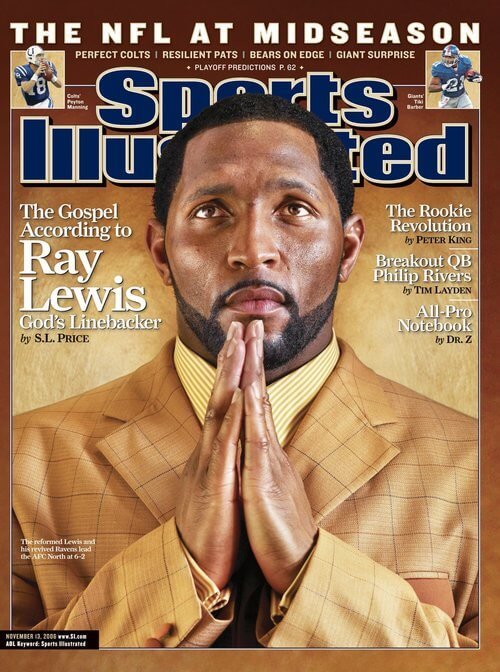

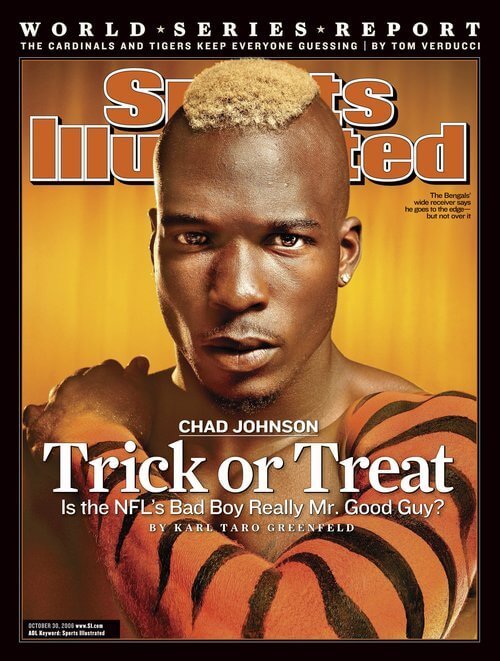

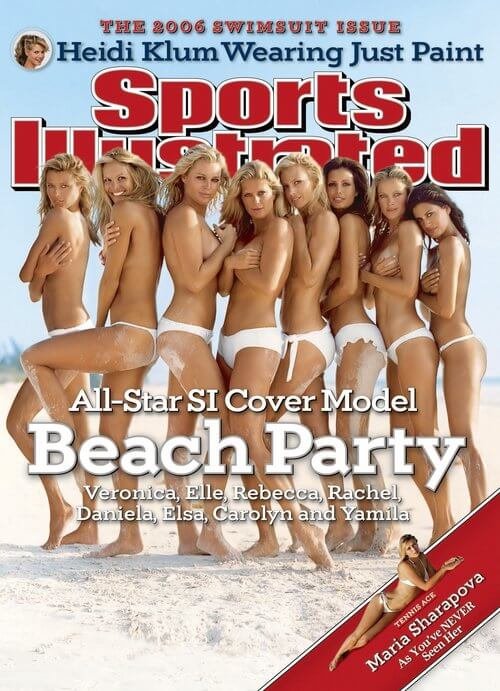














Esquire
(1990-93)
Editor-in-Chief
Returned title to its roots in literary fiction and long-form journalism.
Launched Esquire Gentleman and Esquire Sportsman.
Editor-in-chief of Esquire felt like the best job I was ever going to have. The morning I was fired, my boss stood up when I walked into his office and said something about making changes always being difficult for him. That was it. Leaving the building, I tried to reason with my regrets but it was no good. As in love with the work as I was, I had missed all the signals. I had had no fear. I had had no self-defense. Had I gone too far, or not far enough? That job was suddenly like the girl you loved in college but never touched telling you at a party twenty years later that she wanted you desperately then but not now—you should have just come over.
–The Accidental Life (page 346)
What was I thinking? I ran a white-on-white cover that read "White People: The Trouble with America." I put Howard Stern on the cover in a Barbara Kruger piece that read across his face in her bold italic sans serif type: I hate myself.
–The Accidental Life (page 347)
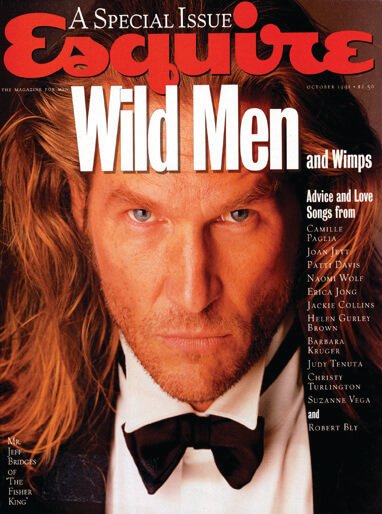
















Smart
(1984-90)
Editor-in-Chief & Chairman
Raised capital and launched men’s lifestyle, arts and literary title.
Launching Smart with less than $200,000 depended on the new desktop technology, and on convincing writers to work for shares in the magazine—that is, more or less for free. Their names were the only real collateral I had and every one I asked signed on, even Hunter who loved the idea of having stock slightly more than he hated working for free. It was a strong run of bylines, including Plimpton, Harrison, McGuane, Peter Maas, Warren Hinckle, Eve Babitz and Jay McInerney. Some even invested money beyond their work, and Elaine Kaufman kicked in a few grand, too.
–The Accidental Life (page 235)






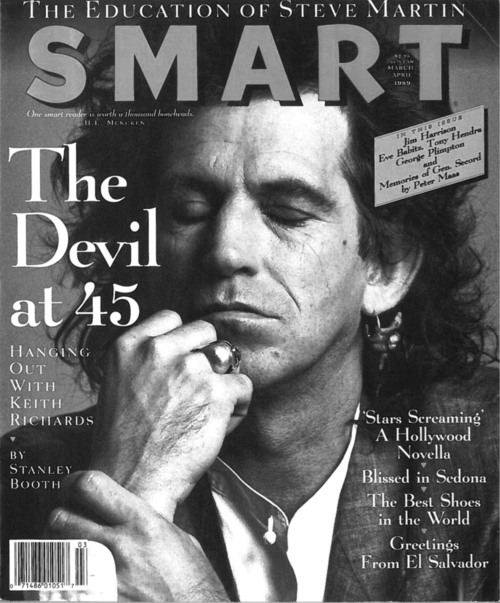




Newsweek
(1983-85)
Managing Editor
Edited “back of book” including media, medicine, science, lifestyle, education, etc.
Assigned and edited first national coverage of AIDS.
Newsweek was reeling after attempting to buy the bogus Hitler Diaries and then shamefully trying to cover the bad judgment by writing in a cover story full of cloying language, “Genuine or not, it almost doesn’t matter in the end.” The top editors, we “Wallendas”—a self-important reference to the aerial circus act—brooded about the process that had led us to such a monumental mistake, and thus we became less enterprising.
–The Accidental Life (page 76)
The reaction to Access was mixed. It was handsome, but what was it about? Wasn’t it really kind of a cross between Popular Mechanics and Esquire? And how relevant was that? But Steve Jobs liked it—especially the cover shot, which made him look princely and brooding, even with that little bow tie.
–The Accidental Life (page 79)







Rolling Stone
(1981-83)
Managing Editor
Newsstand sales jumped from 240,000 to 500,000
I never knew anyone to bring out as much bad feeling and envy as quickly as Rolling Stone’s founder, Jann Wenner. People said they hated Jann. But they loved him too, and if you worked with him on ideas you knew how smart he was and that went a long way. His passion, too, was obvious and moving, and made him vulnerable.
–The Accidental Life (page 106)











Rocky Mountain
(1979-80)
Editor-in-Chief
Conceptualized, launched first regional magazine for Mountain West.
Cold-calling writers I admired was impertinent and I knew it, but launching Rocky Mountain, I called Peter Matthiessen’s Sagaponack number and spoke with his future wife, Maria Eckhart, who was appropriately skeptical and protective: “Another new magazine, really—well, Peter’s not only not here, he’s out there somewhere and, as you can imagine, very, very busy.” Her words were discouraging and a little ironic, but she had a lovely Tanzanian accent and a kind tone, a combination that I learned eventually to translate into advice. She took my number.
–The Accidental Life (page 29)








Outside Magazine
(1977-79)
Senior Editor, Managing Editor
Launched out of Rolling Stone offices in San Francisco.
I landed the job by saying I would get interesting novelists to write about the natural world and whatever intrepid, enlightened young men and women were doing out there in it. We had a statement of purpose proclaiming a commitment to the people, activities, literature, art and politics of the outdoors . . . which I rattled off to Tom McGuane on the phone that morning.
You probably don’t want anything about hunting, he said.
–The Accidental Life (page 41)
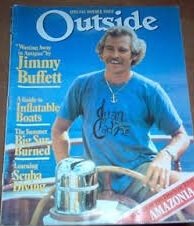




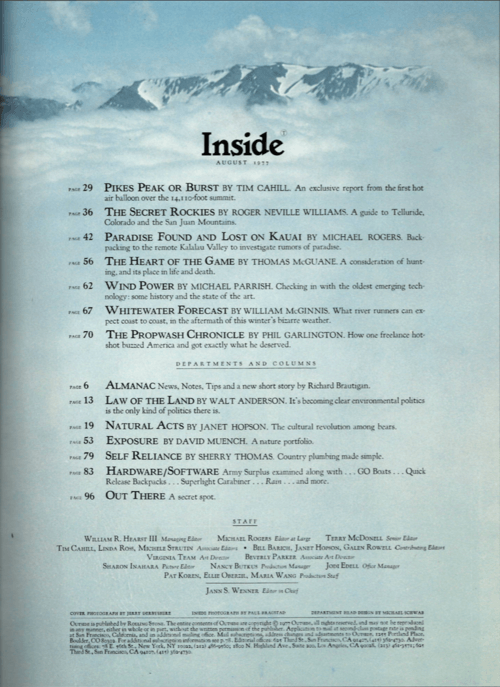

In California
(1974-1977)
LA, Reporter
Alternative weekly launch: “A Village Voice for LA.”
SAN FRANCISCO MAGAZINE, Associate Editor
Wrote cover stories for one of the first successful city magazines.
CITY of SAN FRANCISCO MAGAZINE, Associate Editor
Wrote features for Francis Ford Coppola’s controversial weekly.
There is nothing finer than deciding to write. And if, like me, you were a young writer in the 1970s, there was almost too much to write about.… Depending on how well you wrote and how often you changed jobs or assignments, other writers came in and out of your life. Some of them were already famous and others would be soon, but celebrity didn’t matter because you knew something together—the private thrill that comes from writing a clear and unique sentence.
— The Accidental Life (page 125)









CV
McDonell Company
Principal, Producer, Writer (2013-Present)
New York, NY
Wrote The Accidental Life: An Editor’s Notes on Writing and Writers, Alfred A. Knopf, 2016.
Web and film development: co-created LitHub.com; co-created, produced Sport in America, HBO; produced feature documentary, Plimpton! Starring George Plimpton as Himself.
SPORTS ILLUSTRATED GROUP
Editor (2005-2012)
New York, NY
Responsible for content of Sports Illustrated and 8 other magazines and websites, including Golf Magazine, Golf,com, FanNation.com, SI Latino, SI China and 13 SI Swimsuit editions.
Total group print circulation: 6 MM; total audience: 30 MM.
Total .com traffic: 25 MM UVs; 300 MM PVs.
Launched first enhanced magazine on iPad.
Integrated all print and digital content and delivery.
Launched FanNation.com as community site compliment to SI.com.
Launched the SI Vault — a complete digital archive of SI since 1954.
National Magazine Award, 11 nominations.
Sigma Delta Chi Award.
MPA Digital Award for Website of the Year, Entertainment & Sports, 2006, 2007, 2008.
MPA Digital Awards Best Online Community (FanNation) 2007; Best Web Tool (mySI) 2007.
2012 inductee ASME Editors Hall of Fame.
Managing Editor (2002-2005)
New York, NY
Responsible for content of SI, SI.com, SIKIDS, SIKIDS.com, SI Swimsuit.
Developed SI.com; SI digital revenues up 180% in 2006; 587% over 3 years.
Launched SI Books (20 titles, 5 New York Times Best Sellers)
Edited Frank DeFord, Gary Smith, Rick Reilly, Mitch Albom, Bud Shrake, Michael Lewis, Selena Roberts, Peter King, Dan Patrick, Karl Taro Greenfeld, Tom Verducci, Steve Rushin, William Nack, S.L. Price, John Ed Bradley, Leigh Montville, Walter Iooss Jr. Neil Leifer.
Two National Magazine Awards, 8 nominations.
US WEEKLY
Editor-in-Chief, Vice President Wenner Media LLC. (1999-2002)
New York, NY
Re-launched traditional entertainment fortnightly as a uniquely American weekly tabloid.
Defined new “celebrity” category with “Fashion Police” and other editorial conceits.
Forty percent circulation growth over 3 years.
MEN’S JOURNAL
Editor (1996-1999)
New York, NY
Repositioned and re-launched faltering men’s magazine — incorporating both literary journalism and health and fitness edit into adventure travel category.
Launched MensJournal.com.
Edited Tom Wolfe, Kurt Vonnegut, Sebastian Junger, Carl Hiaasen, Jimmy Buffett, Roy Blount Jr., Rick Telander, Robert Kennedy Jr., Tony Hendra, Ian Frazier, Bruce McCall, Steve Bodio, Scott Anderson, Ed Gray, Mark Kram, Tom Conroy.
SPORTS AFIELD
Editor-in-Chief & Publisher (1993-1996)
New York, NY
Re-launched downscale “hook and bullet” magazine, returning to 107-year-old roots as an upscale “outdoors” lifestyle title.
Three consecutive years of double-digit revenue growth.
Launched Sports Afield Books (with Grove Atlantic).
Edited Phil Caputo, Grits Gresham, Charles Gaines, Robert F. Jones, Ted Kerasote, Doug Peacock, Bruce Babbitt, Verlyn Klinkenborg, Rick Bass, Michael Segell, Thomas McIntyre, Guy Martin, Steve Chapple, Lionel Atwill, Geoffrey Norman.
2 National Magazine Award nominations.
ESQUIRE
Editor-in-Chief (1990-1993)
New York, NY
Returned men’s service title to its roots in literary fiction and long-form journalism.
Conceptualized and launched Esquire Gentleman and Esquire Sportsman.
Launched Esquire Books (with Grove Atlantic).
Edited Norman Mailer, John LeCarre, John Gregory Dunn, Gay Talese, Richard Ben Cramer, James Salter, Richard Ford, Cormac McCarthy, Ken Auletta, Susan Minot, Tom Brokaw, Jimmy Breslin, William F. Buckley Jr., Bill Bradley, Mike Lupica, Robert Sam Ansen, Stanley Bing, John Berendt, Sherman Alexie, Peter Beard, John Sayles, Denis Johnson, Joy Williams, John Sack, Geraldine Brooks, Susan Orlean, Pete Hamill, John Edgar Wideman, Robert Towne, Bruce Wagner, Anthony Hayden Guest, Elizabeth Gilbert, Barry Hannah, Mark Leyner, Bill McKibben, Mickey Spillane, Tad Friend, Michael Musto, Richard Belzer, Barbara Kruger.
Two National Magazine Awards, 10 nominations.
Livingston Award ("Terminal Delinquents," by Jack Hitt and Paul Tough, Dec., 1990).
One of Media Week’s Editors of the Year.
SMART
Editor-in-Chief & Chairman (1984-1989)
New York, NY
Formed limited partnership, raised capital and launched men’s lifestyle, arts and literary title.
Edited Jim Harrison, George Plimpton, Hunter S. Thompson, Rian Malan, Taki, Graydon Carter, Peter Maas, William Broyles Jr., Eve Babitz, Richard Stengel, Allan Gurganus, Jay McInerney, Norman Parkinson, Chee Perlman, William Wegman, Peter Collier, David Horowitz, Michael Segell, Loren Jenkins, Mario Testino, Elizabeth Kaye, Robert Ward, Tim Street-Porter.
Sold to Owen Lipstein and Seiichi Hasume (JICC) for $2 million.
MANHATTAN INC.
Consulting Editor (1986-1987)
New York, NY
Special consultant to Clay Felker.
NEWSWEEK
Assistant Managing Editor (1983-1984)
New York, NY
Responsible for “back of book” including media, medicine, science, lifestyle, education, etc.
Assigned and edited first national cover on AIDS.
Launched Newsweek Access — first “technology lifestyle” title (Wired came 10 years later).
Edited Pete Axthelm, Jack Kroll, Jonathan Alter, Walter Shapiro, Jennett Conant, Vince Coppola, Ken Auchincloss, Jerry Adler, Mark Stevens, Peter Goldman, Michael Rogers, John Dvorak, Steven Levy, Tony Clifton, Annalyn Swan, Bob Rivard, Gary Trudeau, John Ashbery.
ROLLING STONE
Managing Editor (1981-1983)
Doubled newsstand sales from 240,000 to 500,000.
Edited John Irving, Larry McMurtry, P.J. O’Rourke, Ray Carver, Griel Marcus, Richard Price, Joe Klein, Kurt Loder, Scott Spencer, Jane Ann Phillips, Bruce Jay Friedman, Joe Esterhaus, Maryanne Vollers, John Bradshaw, Maureen Orth, Diane K. Shaw, Mark Jacobson, Timothy White, Ben Fong Torres, Chet Flippo, Paul Nelson, Donald Katz, Jonathan Cott, Jann Wenner.
-
Editor-in-Chief (1979-1980)
Denver, COConceptualized and launched first regional magazine for the Mountain West.
Edited Peter Matthiessen, Edward Abbey, Ray Mungo, William Hjortsberg, Michael Moore, Robert Finigan, Molly Haskell, John Nichols, Leslie Marmon Silko, James Welsh.
-
Managing Editor (1977-1979)
New York, NYLaunched first of outdoor magazines eventually categorized as “adventure travel.”
Edited Thomas McGuane, William Kittridge, James Crumley, Tim Cahill, Russell Chatham, E. Jean Carroll, Galen Rowell, Charles Bowden, Thomas Sanchez, Richard Braughtigan.
-
Associate Editor (1976-1977)
San Francisco, CAWrote features for Francis Ford Coppola’s controversial weekly edited by Warren Hinckle, most famous for the cover “San Francisco City of Sin, Why Can’t I Get Laid?”
-
Associate Editor (1975-1976)
San Francisco, CAAssigned and edited features; wrote cover stories at one of the first successful city magazines.
-
Staff Writer (1974-1975)
Los Angeles, CAHelped launch the alternative weekly: “A Village Voice for LA.”
-
Staff Writer/Filmstrip Producer (1972-1973)
New York, NYReported, researched, wrote and edited educational documentaries.
-
Writer/ Photographer (1969-1972)
Europe, Middle EastTraveled extensively; covered “Black September” in Beirut, 1970.
SELECTED PUBLICATIONS
• The Accidental Life: Notes on Writing and Writers, Alfred A. Knopf, 2016.
• Wyoming, poetry, Grove Press, 2010.
• California Bloodstock, novel, Macmillan, 1980; Dell, 1984; Vintage Contemporaries, 1989.
• Lust, Violence, Sin, Magic: Sixty Years of Esquire Fiction (introduction), Grove Press, 1993.
• Sports Illustrated: Fifty Years of Great Writing (introduction), SI Books, 2003
• Hot Shots: 21st Century Sports Photography, (forward), SI Books, 2006.
• Slide Show by Steve Hoffman, (introduction) SI Books, 2009.
• Freelance credits: NY Times, Paris Review, Esquire, Harper’s Bazaar, Vogue, Towne & Country, Vanity Fair.
SELECTED FILM, TELEVISION, VIDEO GAMES
• Sport in America, co-creator, producer, writer, HBO, 2014.
• Plimpton! Starring George Plimpton as Himself, producer, 2013.
• Saturday Night Live, played self (Managing Editor of Rolling Stone) in “Kill Your Landlord,” 1981.
• Miami Vice, screenwriter, “Back in the World,” 1985; “Over the Line,” 1988.
• China Beach, screenwriter, “Waiting for Beckett,” 1988.
• Last Call, host, culture & politics talk show produced by Brandon Tartikoff, MCA, 26 weeks in major markets,1994.
• SI Stories, executive producer, 10-part, 30-minute series based on SI journalism, ESPN, 1994.
• Breakfast with Hunter, played self, feature documentary by Wayne Ewing, 2003.
• Sports Illustrated 40th Anniversary Special: American Beauty, executive producer, 60-minute documentary, 2004.
• Sports Illustrated Swimsuit Model Search, executive producer, 7-week, 30-minute reality show, 2005.
• Guest/expert: Charlie Rose, GMA, Today, ESPN, PBS, NPR, CNN, Fox.
• Night Trap, writer, best-seller, branching fiction video game, Digital Pictures, 1992.
